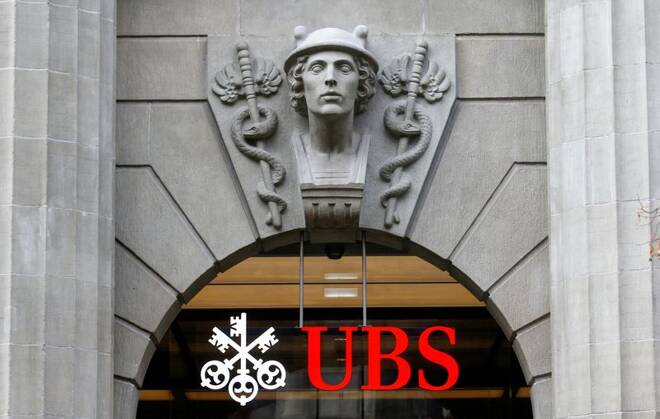Advertisement
Advertisement
UBS trades way through first quarter to land best profit in 15 years
By:
ZURICH (Reuters) - UBS posted a 17% rise in first-quarter net profit on Tuesday, upending expectations for a fall in profit amidst uncertainties over the war in Ukraine, thanks to strong trading. Net profit for the quarter ended in March of $2.136 billion outpaced average expectations for $1.79 billion in a poll of 21 analysts compiled by the Swiss bank.
By Brenna Hughes Neghaiwi
ZURICH (Reuters) -UBS rode strong trading income to post its best first-quarter net profit in 15 years on Tuesday, while signalling its wealth management clients will continue to remain cautious in the coming months due to geopolitical and macro-economic uncertainties.
The results show the world’s biggest wealth manager and Switzerland’s largest bank is on track to meet enhanced profit goals outlined by its Chief Executive Ralph Hamers in February.
As one of the first two major European banks to report results alongside HSBC, UBS’s earnings provided a sharp contrast to profit declines among U.S. rivals this month.
The Zurich-based bank reported a $2.14 billion net profit for the March quarter, outpacing average expectations for $1.79 billion in a poll it had compiled from 21 analysts and fuelling an early share price rise of 1.7% by 0820 GMT.
The UBS investment banking business saw pre-tax profit rise 126% as a surge in global markets trading revenue helped offset a decline in capital markets and advisory revenue, which was hit by slowing dealmaking and IPO activity.
During the prior-year period, investment banking results were hampered by a $774 million loss on the collapse of U.S.-based client Archegos. Excluding that, global markets revenue would have been up 4%, UBS said.
“The first quarter results were unexpectedly strong, mainly thanks to the Investment Bank, while the Asset Management business suffered, as expected, from the deteriorating market environment,” ZKB said in its morning note.
Operating income gains across wealth management in the Americas, Switzerland and Europe were largely wiped out by a slowdown in activity among UBS clients in Asia.
The division managed to partially offset a fall in transaction-based income through a boost to net interest income (NII), which was helped by rising U.S. interest rates and higher deposit and lending volumes, as well as higher recurring fees boosted by $19.4 billion in fresh client fee-generating inflows.
For the first time UBS also tallied around $22 billion in invested assets it held for Russian clients not resident in Switzerland or the wider European Economic Area, while saying it took a hit of some $100 million from its exposure to Russian business in the first quarter.
Its overall results, however, point to a widening gulf between UBS and smaller cross-town rival Credit Suisse, which is struggling under the weight of a string of scandals.
Credit Suisse last week flagged an anticipated first-quarter loss after increasing legal provisions and taking a hit from the fallout of Russia’s invasion of Ukraine.
Buy backs
Wall Street banks have come under pressure amid a slump in dealmaking globally, but volatility fuelled by concerns around interest rate hikes and the economic fallout of the Ukraine war have helped trading desks smash expectations.
Major U.S. banks posted double-digit profit drops as the Russian invasion of Ukraine, coupled with soaring inflation and economic uncertainties, ate into investment banking revenues and as they began stockpiling cash to cushion potential loan losses.
At Goldman Sachs, a 43% drop in profit beat Wall Street expectations, as strong performances in its wealth management and trading businesses partly offset a slump in equity underwriting.
Europe’s biggest bank HSBC, meanwhile, on Tuesday warned that more share buybacks were unlikely this year as a result of rising inflation and economic weakness.
UBS reconfirmed plans to buy back around $5 billion of its own shares in 2022, while giving a mixed outlook for the year.
“Entering the second quarter, clients have generally remained cautious with activity levels reflective of continuing geopolitical and macro uncertainty. Looking ahead, we anticipate this to persist, especially in Asia, given the added effects of COVID-related lockdowns,” outgoing Chief Financial Officer Kirt Gardner told analysts on a call.
A likely hit to transaction and recurring revenues, however, would likely be “more than offset” through higher net interest income, which the bank currently expects to increase by around $1 billion in the remainder of 2022, Gardner said.
“UBS is robustly positioned and on a solid track. However, as the strong quarter in investment banking is not likely to be so easy to continue, the outperformance potential of the share should also be limited,” analysts at ZKB, which has a “market weight” recommendation on the bank’s shares, said.
(Reporting by Brenna Hughes Neghaiwi; Editing by Michael Shields, Muralikumar Anantharaman and Alexander Smith)
About the Author
Reuterscontributor
Reuters, the news and media division of Thomson Reuters, is the world’s largest international multimedia news provider reaching more than one billion people every day. Reuters provides trusted business, financial, national, and international news to professionals via Thomson Reuters desktops, the world's media organizations, and directly to consumers at Reuters.com and via Reuters TV. Learn more about Thomson Reuters products:
Advertisement
